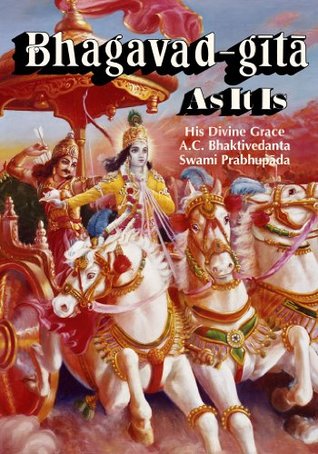More on this book
Community
Kindle Notes & Highlights
In this world man is not meant to toil like hogs. He must be intelligent to realize the importance of human life and refuse to act like an ordinary animal.
one God, one religion, and one occupation. So let there be one common scripture for the whole world – Bhagavad-gītā. And let there be one God only for the whole world – Śrī Kṛṣṇa. And one mantra only – Hare Kṛṣṇa, Hare Kṛṣṇa, Kṛṣṇa Kṛṣṇa, Hare Hare/ Hare Rāma, Hare Rāma, Rāma Rāma, Hare Hare. And let there be one work only – the service of the Supreme Personality of Godhead.
One who takes shelter of the Supreme Lord has nothing to fear, even in the midst of the greatest calamity.
He never fails in His affection for His devotees,
The relationship between the Lord and His servitor is very sweet and transcendental. The servitor is always ready to render a service to the Lord, and, similarly, the Lord is always seeking an opportunity to render some service to the devotee.
Compassion for the eternal soul is self-realization.
Compassion for the dress of a drowning man is senseless.
“He is a miserly man who does not solve the problems of life as a human and who thus quits this world like the cats and dogs, without understanding the science of self-realization.”
When the activities for sense gratification, namely the karma-kāṇḍa chapter, are finished, then the chance for spiritual realization is offered in the form of the Upaniṣads, which are part of different Vedas, as the Bhagavad-gītā is a part of the fifth Veda, namely the Mahābhārata. The Upaniṣads mark the beginning of transcendental life.
Except for work in Kṛṣṇa consciousness, all activities are abominable because they continually bind the worker to the cycle of birth and death.
A man engaged in devotional service rids himself of both good and bad actions even in this life. Therefore strive for yoga, O Arjuna, which is the art of all work.
Arjuna said: What are the symptoms of one whose consciousness is thus merged in Transcendence? How does he speak, and what is his language? How does he sit, and how does he walk?
Sri Krishna had given the somewhat academic description of the self-realisef soul, but now Arjuna needs a more concrete down-to-earth understanding of how such a person behaves in the real world
One who is not in transcendental consciousness can have neither a controlled mind nor steady intelligence, without which there is no possibility of peace. And how can there be any happiness without peace?
The whole institution of varṇa and āśrama is designed to help us reach this goal of life.
when the mind is conquered, one voluntarily agrees to abide by the dictation of the Personality of Godhead, who is situated within the heart of everyone as Paramātmā. Real yoga practice entails meeting the Paramātmā within the heart and then following His dictation.
mundane scholarship and mental speculation, which may be as good as gold to others, are of no greater value than pebbles or stones.
A person is said to be still further advanced when he regards all – the honest well-wisher, friends and enemies, the envious, the pious, the sinner and those who are indifferent and impartial-with an equal mind.
He is always aloof from material things because he is always transcendental, and he is always alone, having nothing to do with persons not in Kṛṣṇa consciousness.
The goal of life is to know Kṛṣṇa, who is situated within the heart of every living being as Paramātmā, the four-handed Viṣṇu form.


